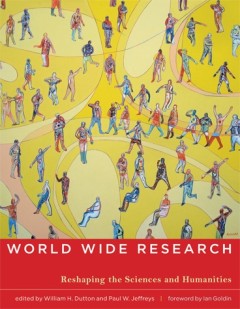Filter by

Counterspeech: multidisciplinary perspectives on countering dangerous speech
- Edition
- -
- ISBN/ISSN
- 9781003377078
- Collation
- -
- Series Title
- -
- Call Number
- -
- Edition
- -
- ISBN/ISSN
- 9781003377078
- Collation
- -
- Series Title
- -
- Call Number
- -

Entity Alignment
This open access book systematically investigates the topic of entity alignment, which aims to detect equivalent entities that are located in different knowledge graphs. Entity alignment represents an essential step in enhancing the quality of knowledge graphs, and hence is of significance to downstream applications, e.g., question answering and recommender systems. Recent years have witnessed …
- Edition
- -
- ISBN/ISSN
- 978-981-99-4250-3
- Collation
- XI, 247
- Series Title
- -
- Call Number
- -

Technologies of vision :the war between data and images
An investigation of the computational turn in visual culture, centered on the entangled politics and pleasures of data and images.OCLC-licensed vendor bibliographic record.
- Edition
- -
- ISBN/ISSN
- 9780262343336
- Collation
- 1 online resource.
- Series Title
- -
- Call Number
- -

Updating to remain the same :habitual new media
What it means when media moves from the new to the habitual -- when our bodies become archives of supposedly obsolescent media, streaming, updating, sharing, saving.OCLC-licensed vendor bibliographic record.
- Edition
- -
- ISBN/ISSN
- 9780262333771
- Collation
- 1 online resource
- Series Title
- -
- Call Number
- -
Self-tracking
People keep track. In the eighteenth century, Benjamin Franklin kept charts of time spent and virtues lived up to. Today, people use technology to self-track: hours slept, steps taken, calories consumed, medications administered. Ninety million wearable sensors were shipped in 2014 to help us gather data about our lives. This book examines how people record, analyze, and reflect on this data, l…
- Edition
- -
- ISBN/ISSN
- 9780262334693
- Collation
- 1 online resource (xi, 233 pages) :illustrations.
- Series Title
- -
- Call Number
- -

New tendencies :art at the threshold of the information revolution (1961-1978)
An account of a major international art movement originating in the former Yugoslavia in the 1960s, which anticipated key aspects of information aesthetics.OCLC-licensed vendor bibliographic record.
- Edition
- -
- ISBN/ISSN
- 9780262331913
- Collation
- 1 online resource (x, 395 pages).
- Series Title
- -
- Call Number
- -

Machine learners :archaeology of a data practice
Machine learning - programming computers to learn from data - has spread across scientific disciplines, media, entertainment, and government. Medical research, autonomous vehicles, credit transaction processing, computer gaming, recommendation systems, finance, surveillance, and robotics use machine learning. Machine learning devices (sometimes understood as scientific models, sometimes as oper…
- Edition
- -
- ISBN/ISSN
- 9780262342551
- Collation
- 1 online resource (xvi, 252 pages) :illustrations
- Series Title
- -
- Call Number
- -

Metadata
"When "metadata" became breaking news, appearing in stories about surveillance by the National Security Agency, many members of the public encountered this once-obscure term from information science for the first time. Should people be reassured that the NSA was "only" collecting metadata about phone calls -- information about the caller, the recipient, the time, the duration, the location -- a…
- Edition
- -
- ISBN/ISSN
- 9780262331197
- Collation
- 1 online resource (xi, 239 pages) :illustrations.
- Series Title
- -
- Call Number
- -

Cloud Computing
Das Herausgeberwerk zeigt Chancen und Risiken des Cloud Computings auf, bringt Lesern das Thema durch anschauliche Beispiele aus Forschung und Praxis näher und zeigt die Implikationen auf, die aus dieser neuen Infrastruktur resultieren. Die Beitragsautoren präsentieren technische Lösungen, Geschäftsmodelle und Visionen, die einerseits die Herausforderungen und Hürden des Cloud Computing au…
- Edition
- -
- ISBN/ISSN
- 978-3-658-20967-4
- Collation
- -
- Series Title
- Edition HMD
- Call Number
- XVI, 216

World Wide Research: Reshaping the Sciences and Humanities
Here, experts examine ways in which the use of increasingly powerful and versatile digital information and communication technologies are transforming research activities across all disciplines.
- Edition
- -
- ISBN/ISSN
- 9780262272087
- Collation
- -
- Series Title
- -
- Call Number
- -
 Computer Science, Information & General Works
Computer Science, Information & General Works  Philosophy & Psychology
Philosophy & Psychology  Religion
Religion  Social Sciences
Social Sciences  Language
Language  Pure Science
Pure Science  Applied Sciences
Applied Sciences  Art & Recreation
Art & Recreation  Literature
Literature  History & Geography
History & Geography